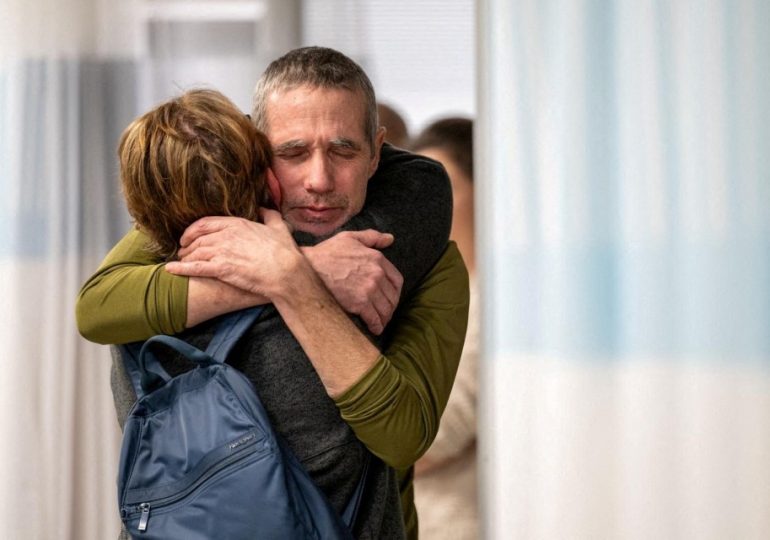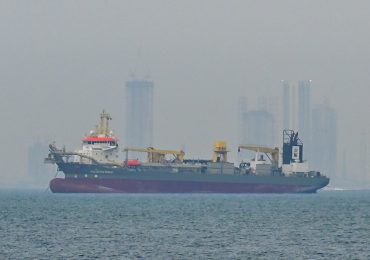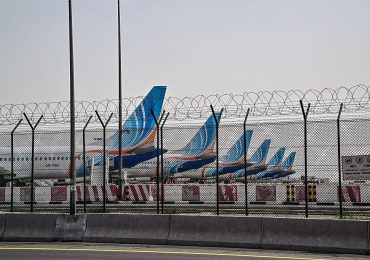A PROPOSED Israel-Hamas truce deal could see a pause in fighting and the release of hostages during the holy month of Ramadan.
The terror group has received a draft proposal from Gaza peace talks in Paris, a senior source close to the discussions said on Tuesday.
ReutersIsraeli hostage Fernando Marman is freed in a special forces operation in Rafah, Gaza[/caption]
ReutersIsraeli soldiers operate among the ruins of buildings in the Gaza Strip[/caption]
AFPAn Israeli Air Force fighter jet flies over the border area with south Lebanon[/caption]
US President Joe Biden said Israel is willing to halt its military activities in Gaza for the Muslim fasting month of Ramadan – but only if a deal is reached to release the hostages still held by militants.
He raised hopes a temporary ceasefire to end the bloodbath in Gaza could be possible “by next Monday”.
Hamas is understood to be studying the draft proposal.
Israel-Hamas proposed truce deal explained
HAMAS has received a draft proposal from Paris for a pause in fighting and the exchange of Palestinian prisoners for Israeli hostages.
A source close to the truce talks told Reuters the first stage of the proposed deal would last 40 days, with other terms to include:
Prisoner-hostage exchange at a ratio of 10 to one
Both parties stop their military operations completely
Aerial reconnaissance operations over Gaza stops for eight hours a day
All 40 Israeli hostages released in exchange for 400 Palestinian prisoners
Gradual return of all displaced civilians, except men of military service age, to the northern Gaza Strip
After commencing the first phase, Israel repositions its forces away from densely-populated areas in the Gaza Strip
Commitment to bring in 500 trucks per day of humanitarian aid
Commitment to providing 200,000 tents and 60,000 caravans
Allow the rehabilitation of hospitals and bakeries in Gaza, including allowing the entry of equipment and providing fuel for these purposes
Israel agrees to the entry of heavy machinery and equipment to remove rubble and assist with other humanitarian purposes
Israel provides quantities of fuel shipments for humanitarian purposes that increase over time. Hamas pledges not to use the machines and equipment to threaten Israel
It is understood that the arrangements agreed in the first phase will not apply to the second phase, which will be subject to later and separate negotiations
Negotiators from the US, Egypt, and Qatar have drafted a deal that involves Hamas freeing some hostages in exchange for the release of Palestinian prisoners and a six-week ceasefire.
During the temporary pause, negotiations over the release of the remaining hostages held captive by militants would continue.
Biden told reporters in New York on Monday, after taping an appearance on NBC’s Late Night With Seth Meyers: “My national security adviser tells me that we’re close.
“We’re close. We’re not done yet.
“My hope is by next Monday, we’ll have a ceasefire.”
He said during the Meyers interview: “Ramadan’s coming up and there has been an agreement by the Israelis that they would not engage in activities during Ramadan as well, in order to give us time to get all the hostages out.”
The president’s appearance came hours before details of the draft proposal were reported by Reuters.
Israeli Prime Minister Benjamin Netanyahu‘s office earlier said that the army had presented to the War Cabinet its operational plan for a ground offensive into Rafah.
The Palestinian town, located in the southern Gaza Strip along the border with Egypt, is currently home to some 1.4 million people – most of whom are displaced Palestinians from other parts of Gaza.
Many in Rafah are now living in makeshift shelters without sufficient food, water, or blankets.
The humanitarian crisis has sparked global concern as Israel’s allies warned it must protect civilians in its ongoing battle against Hamas.
Israel launched its operations in Gaza following an attack by the terror group on southern Israel on October 7, when militants killed 1,200 people and took about 250 others hostage.
A month-long pause in fighting has been mooted amid growing fears that only a few dozen hostages may be left to to save.
At least 30 of the remaining 130 hostages have been confirmed dead but many more may have perished in appalling conditions in Hamas’ terror tunnel network.
Israel’s prime minister is demanding “proof-of-life” to gauge numbers of captive survivors.
He has also stoked Hamas fury by demanding high-ranking Hamas terrorists swapped for innocent hostages are deported to Qatar rather than Palestinian territories.
Progress was made after Hamas dropped “outrageous” demands including a complete withdrawal of Israeli forces from the 25-miles coastal strip.
Netayahu said his forces will press on and destroy Hamas’ remaining battalions in last stronghold Rafah once the pause in fighting ends.
Some 30,000 Palestinians have died in the months since, according to the Health Ministry – which does not distinguish between fighters and noncombatants.
Israel’s military this week claimed to have destroyed a massive underground tunnel complex that was being used by Hamas.
The tunnel was said to have stretched six miles between the Turkish-Palestinian Friendship cancer hospital and Israa University.
Chief Operations Officer of the Nahal Brigade combat team, identified only as Major Ron, explained: “During our raids, we discovered an 18-metre-deep tunnel under the hospital with two exits both in the southern and northern parts of the hospital.”
He added: “Throughout the entire war, we’ve witnessed Hamas using civilian infrastructure, ie, hospitals, kindergartens, schools and more, to dig tunnels and dispose of weapons, which we also found inside the Turkish hospital.”
The Israel Defence Forces said the tunnel was used by Hamas’ Zeitoun battalion and other brigades to move around the Strip, and contained subterranean rooms with toilets, storage areas, and the bodies of Palestinian operatives who died in raids by Israeli troops.
Dr Subhi Skeik, the director of the Turkish hospital, told The Times that the hospital had nothing to do with Hamas activity.
EPAA truck taking humanitarian aid to Gaza crosses the Rafah border crossing between the Gaza Strip and Egypt[/caption]
Leave a comment








